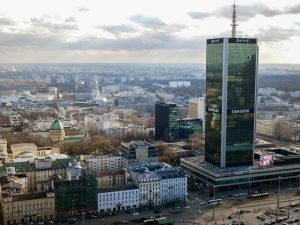Eye-watering energy price cap may save businesses… but comes at a serious cost | Ed Conway
A month ago, a company called CF Fertilisers announced that it was pausing production of ammonia at its factory in Billingham.
Ammonia, the basis for most modern fertilisers (and for that matter explosives) is in some respects the single most important man-made substance in the world.
Without it about half the human race would starve. Billingham was the UK’s last remaining fertiliser producer: so, this stuff matters.
The good news is that you can ship ammonia relatively easily. So, CF – an American firm – will stop making ammonia here and instead bring it in from the US.
Why, you are probably wondering, am I mentioning all of this on a day when the government has agreed to splurge many billions of pounds on support for businesses? Because CF’s plight is right at the heart of this.
Read more:
Energy bills: How government aid will affect homes and businesses
Liz Truss ‘will go bigger than expected on energy crisis’ as PM
Pound falls to 37-year low as cost of servicing government debt hits August record
Ammonia is made with natural gas. The reason CF paused production in the UK is because with European gas prices so high, and with American gas prices so much lower, the sums simply stopped adding up.
Chemicals companies have a phrase for this kind of decision… “make or buy”.
At a certain cost level, the economics of making something in a given location stop making sense; you have to buy that product in from abroad instead.
In CF’s case, the pendulum swung from “make” to “buy” earlier on this summer. And it was this perilous threshold the Department for Business Energy and Industrial Strategy had in mind when it set the energy price cap for businesses.
When wholesale gas prices rise above a level of around 220p per therm, businesses will be protected from the increase. The taxpayer will pay the difference between that level and the wholesale price; something similar goes for electricity.
The consequence of this is pretty enormous. It represents one of the biggest economic interventions in modern times (though in fairness, what with the analogous scheme for households the other week and the furlough scheme a few years ago, these near-unprecedented moments seem to be coming round more and more often).
The upshot is that certain businesses which might otherwise have had to shut down, forcing us to buy in products from abroad, may be able to keep things going a bit longer.
For smaller, less energy-intensive businesses – pubs, hairdressers and retailers – the scheme will help. It is the difference between eye-wateringly high bills and end-of-the-world bills.
None of this will prevent the economy from facing a serious downturn in the coming months. But it might help – and brings the UK closer in line to other European and Nordic countries, almost all of whom are helping their energy-intensive companies either to keep going or to go into hibernation until energy costs come down.
But at what cost? The short answer is we don’t know. No one has a clue. As things stand the business package is due to last only six months – unlike the household energy guarantee which goes on for two years.
According to Cornwall Insight, at current energy levels the business scheme could cost a whopping £25bn. And if you assumed that it got extended for two years, then that works out at £100bn.
Add on the household energy guarantee, which at the prevailing energy price a couple of weeks ago was poised to cost £70bn a year and the whole thing could add up to nearly a quarter of a trillion pounds. This is an astounding sum.
But here’s the thing: we simply don’t know how much it will cost because that’s almost entirely dependent on what happens to the wholesale gas price.
As it happens, that price has dropped a fair bit in recent weeks amid promising news about the amount of gas continental European countries have stored and hopes that the war may be relatively short-lived.
If it keeps falling, then these schemes could end up being considerably cheaper; if it rises then they could be eye-wateringly expensive. We just don’t know. This is one of those situations which goes well beyond fiscal arithmetic.
All of which helps explain why investors are quite so nervous about the UK’s public finances right now. This recent splurge doesn’t entirely explain the weakness of the pound.
The dollar is very strong right now, for one thing. However, it’s certainly a part of the story. You can tell this because, first, the pound is weak against other currencies as well and, second, because other metrics indicate an increased level of concern.
Consider, for instance, the credit default swaps which are a form of insurance against an issuer defaulting on their debts. The CDS spreads on UK debt are rising – up from among the lowest in the G7 to among the highest.
Market participants who decide whether or not to invest in this country seem to be getting a little worried. And one can understand their point of view.
The Truss government has begun its tenancy by signing two pretty big blank cheques. We are jumping into a pool, but no-one knows how treacherous the waters could end up getting.


